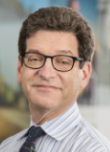How To Increase Patient Diversity: LLS Brings Clinical Trials To Underrepresented Communities
By Lee Greenberger, Ph.D., Chief Scientific Officer, The Leukemia & Lymphoma Society

Racial and ethnic minorities, rural residents, and people with lower socioeconomic status are overwhelmingly underrepresented in clinical trials. The Leukemia & Lymphoma Society (LLS) has launched a first-of-its-kind research grant program to help move the needle on this long-standing problem.
The LLS IMPACT research grants (Influential Medicine Providing Access to Clinical Trials) bring clinical trials to local communities to increase and diversify enrollment. Healthcare leaders know we need to build trust within underserved communities, increase awareness of clinical trials, and educate about their benefits. But none of that is enough if trials are not accessible to these communities, because their members also commonly face logistical challenges to enrolling, including the inability to take time off work, finding childcare, and costs associated with traveling long distances.
IMPACT will help close this accessibility gap by creating hub and spoke systems between clinical trial leaders at major cancer centers and community-based oncologists in their regions. The IMPACT clinical trials will be led by major cancer centers but facilitated (all or in part) at community centers where patients already go for regular care.
The first round of IMPACT funding was awarded to three highly respected major cancer centers that reach a variety of underserved populations in different parts of the country: Mayo Clinic Cancer Center, Vanderbilt University Medical Center, and Weill Cornell Medicine. These centers were also chosen because of the number and scope of trials they run for a variety of blood cancer patients, and because they had trials that could be done, at least mostly, in community settings.
- Mayo Clinic serves an area where 40% of the population is in rural counties, 11% live below the Federal Poverty level, 16% receives Medicaid, and about 10% is part of a minority population.
- Vanderbilt serves communities in the rural South, including one of the most economically vulnerable areas in the country with some of the highest cancer incidence and mortality rates.
- Weill Cornell Medicine is located in Manhattan but serves large urban populations in Brooklyn and Queens where half of cancer patients are people of color. While close in terms of distance, travel time for residents of so-called “outer boroughs” of New York City into Manhattan can be more than 90 minutes and require multiple subway transfers.
Mayo, Vanderbilt, and Weill are co-funding the IMPACT programs, demonstrating their partnership with LLS and commitment to this important work.
LLS has an unwavering commitment to health equity. Every blood cancer patient should have equal access and ability to benefit from the latest advances in clinical treatment. We know our best chance to learn how people of different races and ethnicities respond to medical treatments is through diverse clinical trials. This $3.75 million five-year program is supporting infrastructure to increase community access to select trials at the first three IMPACT sites, the plan is to open more trials and expand to more centers. Our goal is to increase clinical trial enrollment from community centers to at least 20% of the total enrollment in IMPACT clinical trials.
In addition to the grant funds supported by IMPACT, in 2020, LLS supported more than 190 active research grants and 20 partnerships through our venture philanthropy arm, the Therapy Acceleration Program, totaling more than $186 million in multi-year funding. LLS is a long-standing leader of accelerating high-risk, innovative blood cancer therapeutics and change the standard of care in leukemia, lymphoma, Hodgkin's disease and myeloma.
Building Community Trust Requires A Long-Term Strategy And Ongoing Commitment
Bringing trials to the community is essential, but this not some happy ending movie. Just because we build it, they may not come. Clinical trials are built on trust between sponsors, investigators, and participants. LLS has been working to build trust and connections with underserved communities for years.
LLS has programs in place across research, advocacy, and patient services to address health disparities. These efforts include Myeloma Link, a community-based outreach and education program in African American communities and Spanish-language resources and services for patients and caregivers. LLS is also leading a national study with the University of Florida to increase primary care providers’ capacity to educate diverse patients with cancer about clinical trials. Through our advocacy work, LLS is also pursuing policy efforts to improve access to trials for underrepresented patients.
This long-term commitment was needed to build credibility so LLS can do for these communities what it does for others: raise awareness about clinical trial availability, educate individuals about the risk and benefits associated with their options, and dispel common myths that persist about cancer clinical trials.
The Role Of Pharmaceutical Company Partners
There is power in collaboration among academic medical centers, major hospital organizations, commercial enterprise, and advocacy organizations like ours that are committed to improving health equity and outcomes for all. In addition to support from LLS donors,1 the IMPACT program is also supported by forward-thinking philanthropic investment from companies including Bristol Myers Squibb and MorphoSys Foundation. These companies recognize the importance of increasing diversity in clinical trials, while boosting and speeding up enrollment. Faster enrollment reduces trial costs while diversity makes for stronger scientific evidence of the efficacy of therapies.
As we develop and roll out this model, I encourage pharmaceutical companies to follow our progress and think about how they can get involved and learn from our experience. One key way is to consider ways to structure future clinical trials so they can be completed in at-risk communities. Another is to support programs like ours to amortize benefits of the infrastructure that is already in place.
Notes
- IMPACT is supported through LLS donor investment from Louise and John Bryan, Edward J. Phillips Family Foundation, Rahr Corporation and Cal Turner, Jr.
About The Author:
 Lee Greenberger, Ph.D., is Chief Scientific Officer of the Leukemia and Lymphoma Society. He plans and executes the strategy for all LLS research programs. This effort includes a grant portfolio with over 190 active projects worldwide, as well as the Therapy Acceleration Program, a venture philanthropy initiative, with more than 15 assets currently – three of which have earned FDA approval in the past few years. Lee has directed over $350M of research support during the past eight years with LLS. Previously, he was global head of search and diligence for oncology and immunology at Bristol-Myers Squibb.
Lee Greenberger, Ph.D., is Chief Scientific Officer of the Leukemia and Lymphoma Society. He plans and executes the strategy for all LLS research programs. This effort includes a grant portfolio with over 190 active projects worldwide, as well as the Therapy Acceleration Program, a venture philanthropy initiative, with more than 15 assets currently – three of which have earned FDA approval in the past few years. Lee has directed over $350M of research support during the past eight years with LLS. Previously, he was global head of search and diligence for oncology and immunology at Bristol-Myers Squibb.
